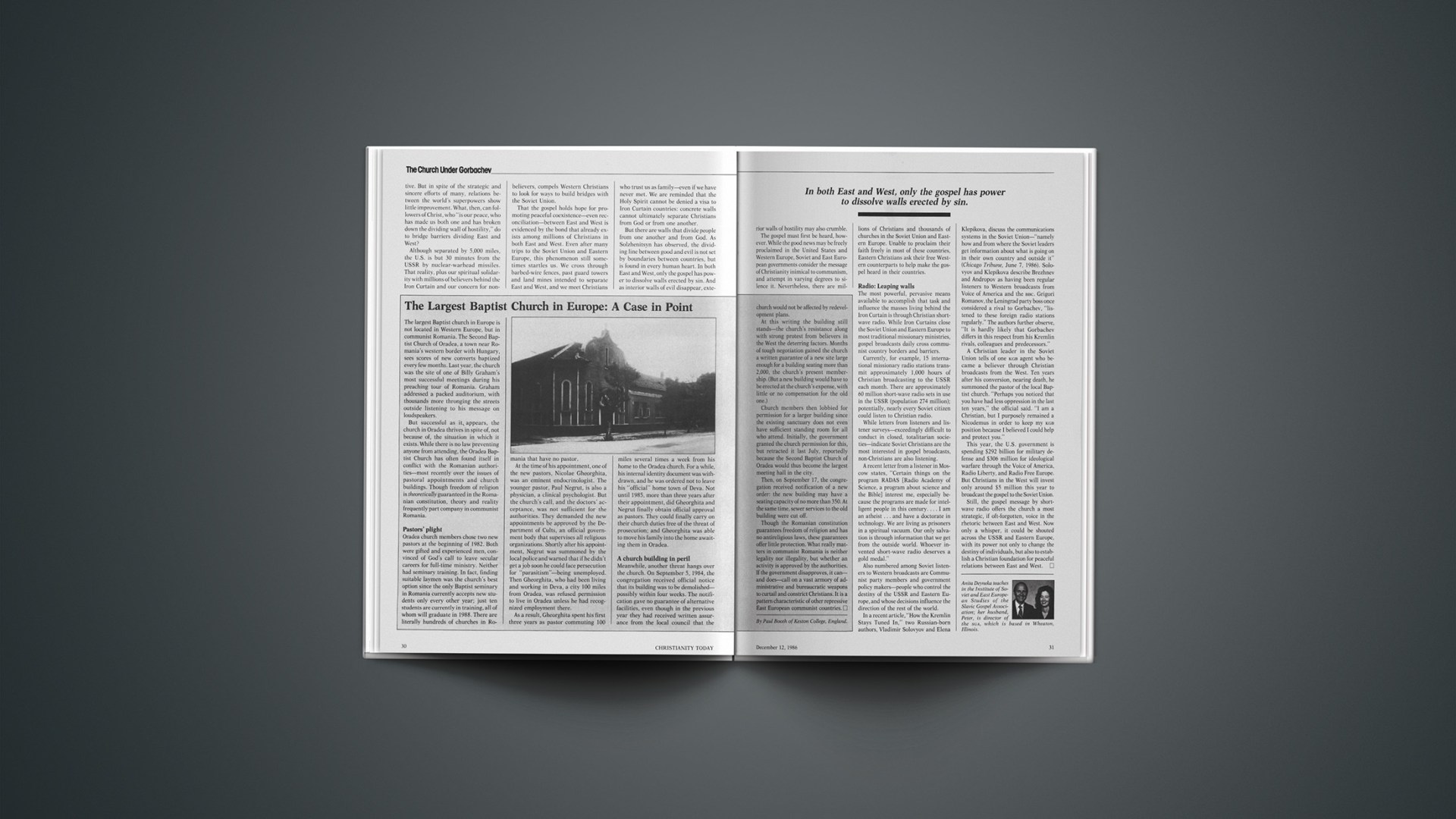The largest Baptist church in Europe is not located in Western Europe, but in communist Romania. The Second Baptist Church of Oradea, a town near Romania’s western border with Hungary, sees scores of new converts baptized every few months. Last year, the church was the site of one of Billy Graham’s most successful meetings during his preaching tour of Romania. Graham addressed a packed auditorium, with thousands more thronging the streets outside listening to his message on loudspeakers.
But successful as it appears, the church in Oradea thrives in spite of, not because of, the situation in which it exists. While there is no law preventing anyone from attending, the Oradea Baptist Church has often found itself in conflict with the Romanian authorities—most recently over the issues of pastoral appointments and church buildings. Though freedom of religion is theoretically guaranteed in the Romanian constitution, theory and reality frequently part company in communist Romania.
Pastors’ Plight
Oradea church members chose two new pastors at the beginning of 1982. Both were gifted and experienced men, convinced of God’s call to leave secular careers for full-time ministry. Neither had seminary training. In fact, finding suitable laymen was the church’s best option since the only Baptist seminary in Romania currently accepts new students only every other year; just ten students are currently in training, all of whom will graduate in 1988. There are literally hundreds of churches in Romania that have no pastor.
At the time of his appointment, one of the new pastors, Nicolae Gheorghita, was an eminent endocrinologist. The younger pastor, Paul Negrut, is also a physician, a clinical psychologist. But the church’s call, and the doctors’ acceptance, was not sufficient for the authorities. They demanded the new appointments be approved by the Department of Cults, an official government body that supervises all religious organizations. Shortly after his appointment, Negrut was summoned by the local police and warned that if he didn’t get a job soon he could face persecution for “parasitism”—being unemployed. Then Gheorghita, who had been living and working in Deva, a city 100 miles from Oradea, was refused permission to live in Oradea unless he had recognized employment there.
As a result, Gheorghita spent his first three years as pastor commuting 100 miles several times a week from his home to the Oradea church. For a while, his internal identity document was withdrawn, and he was ordered not to leave his “official” home town of Deva. Not until 1985, more than three years after their appointment, did Gheorghita and Negrut finally obtain official approval as pastors. They could finally carry on their church duties free of the threat of prosecution; and Gheorghita was able to move his family into the home awaiting them in Oradea.
A church building in peril
Meanwhile, another threat hangs over the church. On September 5, 1984, the congregation received official notice that its building was to be demolished—possibly within four weeks. The notification gave no guarantee of alternative facilities, even though in the previous year they had received written assurance from the local council that the church would not be affected by redevelopment plans.
At this writing the building still stands—the church’s resistance along with strong protest from believers in the West the deterring factors. Months of tough negotiation gained the church a written guarantee of a new site large enough for a building seating more than 2,000, the church’s present membership. (But a new building would have to be erected at the church’s expense, with little or no compensation for the old one.)
Church members then lobbied for permission for a larger building since the existing sanctuary does not even have sufficient standing room for all who attend. Initially, the government granted the church permission for this, but retracted it last July, reportedly because the Second Baptist Church of Oradea would thus become the largest meeting hall in the city.
Then, on September 17, the congregation received notification of a new order: the new building may have a seating capacity of no more than 350. At the same time, sewer services to the old building were cut off.
Though the Romanian constitution guarantees freedom of religion and has no antireligious laws, these guarantees offer little protection. What really matters in communist Romania is neither legality nor illegality, but whether an activity is approved by the authorities. If the government disapproves, it can—and does—call on a vast armory of administrative and bureaucratic weapons to curtail and constrict Christians. It is a pattern characteristic of other repressive East European communist countries.
By Paul Booth of Keston College, England.









